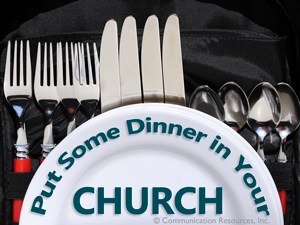Put Some Dinner in Your Church

By Henry G. Brinton
When I served a multicultural Presbyterian church in Alexandria, Virginia, older white parishioners didn’t always see eye-to-eye with younger African immigrants in the congregation. Disagreements arose over a variety of issues, including worship and church government. But when we sat down for international potluck dinners from time to time, the experience was pure peace and harmony. Everyone enjoyed the tastiest of dishes from the American South and from Ghana, West Africa, and I learned that the best path to reconciliation is through the stomach!
This lesson should not have come as a surprise to me. After all, the table plays an important role in religions around the world. Jews have Seders during Passover, eating symbolic foods as they remember the exodus from Egypt. Muslims fast for Ramadan and then break their fasts with family members and friends at festive iftars at the end of each day. Christians have Communion as a regular part of worship, remembering that Jesus broke bread at the Last Supper and said, “Do this in remembrance of me” (Luke 22:19). He saw the meal as a unifying experience, and prayed that his followers “may become completely one” (John 17:23).
In all of these observances, people practice their faith by eating at a table. And while shared meals have been part of the religious practice of numerous groups for thousands of years, they are being given a new focus in Christianity through the “dinner church” movement — churches that have a shared meal at the center of congregational life.
These communities of faith are discovering the truth of an observation made by Harley Camden, the fictional Methodist minister in my mystery novel. City of Peace. After sitting down for dinner in the home of two Coptic Christians from Egypt, Harley remarks, “Think of how much better the world would be if people actually sat down and ate with each other.”
Harley Camden is imaginary, but Methodist dinner churches are not. In the Florida Conference of the United Methodist Church, a dinner-church initiative called “Fresh Expressions” is gaining ground across the state. With a focus on simple meals and conversations around tables, the conference will launch 55 new dinner churches by September 2019, offering meals in venues ranging from community centers to public school cafeterias to outdoor parks.
“Fresh Expressions” is part of a larger movement that has been studied by Kendall Vanderslice in a new book called We Will Feast: Rethinking Dinner, Worship, and the Community of God. To write the book, she spent a year visiting dinner churches across the country, and discovered that in all of these congregations, relationships deepened as people ate, prayed and talked together. From Saint Lydia’s in Brooklyn to Garden Church in San Pedro, California, she found that dinner churches satisfy two basic human needs: to be nourished by food and to find companionship with one another.
To the book, Vanderslice brought experience in the restaurant industry and expertise as a baker, combined with a study of food at Boston University and theology at Duke University. She discovered that at Potluck Church in Kentucky, every participant brings something to the table, and a former mayor worships alongside people who struggle to pay their monthly rent. In Seattle, community dinners are held throughout the city, meals in which feasting with friends is combined with feeding the hungry. When Church in a Pub offers worship in Lansing, Michigan, restaurant servers take orders while the pastor offers Communion. In all of these congregations, stomachs are filled and Jesus is believed to be present at the table.
“When Jesus established his church, he did so around the table,” concludes Vanderslice. “Christ asked us to do something in remembrance of him. He didn’t first ask us to believe in the right things but to practice them. We eat and drink, believing that Christ is present with us. We eat and drink, drawing near to God’s beloved creation, believing that we are doing the work of establishing God’s kingdom here on earth.” At the table, we clearly do something — we eat and drink. And out of the act of doing comes the deepening belief that Christ is present with us and the kingdom of God is being established.
Will dinner churches become the new model for churches everywhere? Probably not, since most congregations are not going to radically restructure their programs around shared meals. But in a Christian community torn apart by theological debates, dinner-church services offer the possibility that the Body of Christ can be unified through the sharing of bread.
On a smaller scale, churches across the country can certainly benefit from gathering people around tables to be nourished in body and spirit, in meals that help people to grow stronger as individuals and as a community. By putting some dinner in your church, you can take a step toward fulfilling the desire of Jesus that his followers would “become completely one.”
Henry G. Brinton, a contributor to Homiletics for more than 20 years, is pastor of Fairfax Presbyterian Church in Virginia, and has written on religion and culture for The New York Times, The Washington Post, USA Today and Huffington Post. He is also the author of books ranging from City of Peace to The Welcoming Congregation: Roots and Fruits of Christian Hospitality.
Share this Post:
Looking for More?
Imagine having fresh help in preparing your sermons right at your fingertips, especially during those weeks when your words and ideas are not flowing easily. Homiletics Online won’t write the sermon for you but once you’ve used this treasury of solid content, you’ll wonder how you ever got along without it.
Would you like to see your post on this blog?
We are always looking for talented and passionate writers who want to share their ideas on preaching the Gospel. If that sounds like you, then please use the button to submit a guest post.

